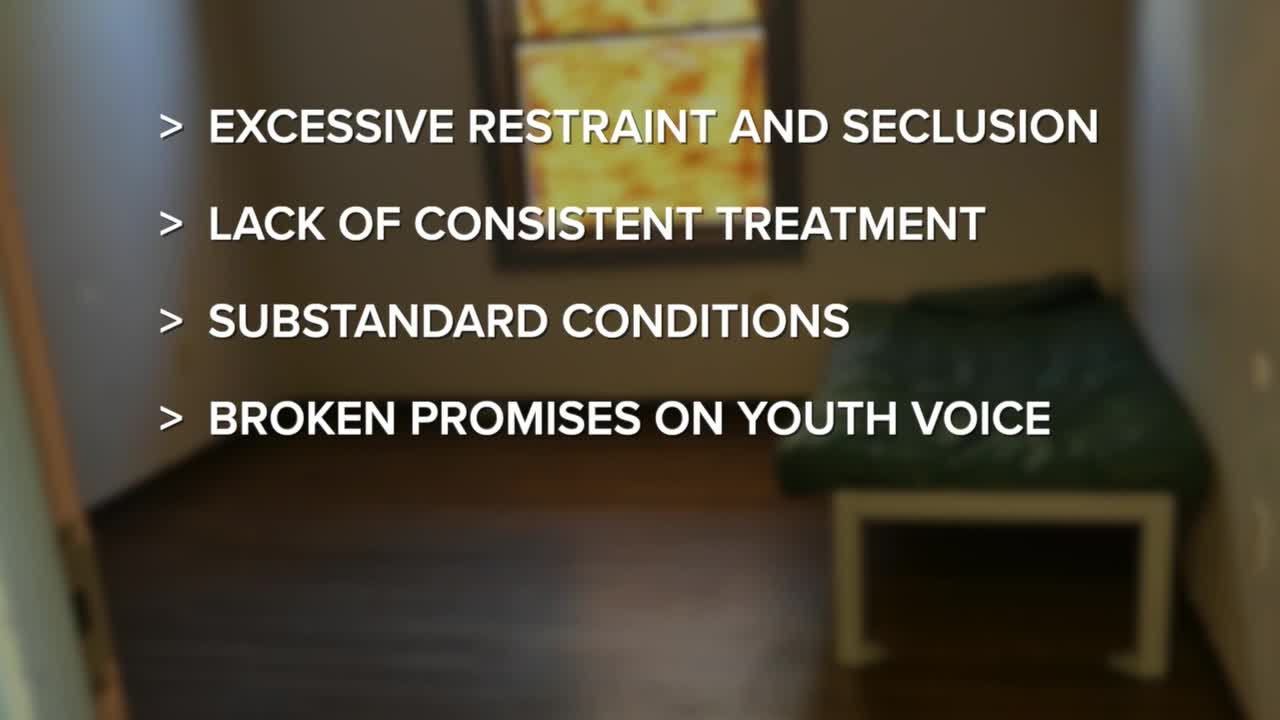DENVER — Disability Law Colorado spent three years documenting a list of concerns at Southern Peaks Regional Treatment Center in Cañon City, and has now made those "dangerous conditions" public.
The report includes years of monitoring visits, interviews with nearly 50 kids and input from families and staff, according to a press release.
"We went back again that year to see how things were going, and initially issued an internal report with some recommendations, and have been having conversations with them to try to improve the conditions there," Co-Legal Director at Disability Law Colorado Emily Harvey said. "It just at this point feels like a cycle that's unbreakable in the facility with making improvements, and then things really backsliding."
Denver7 sat down with Harvey and asked if there were any concerns with going public with their findings.
"I think the biggest concern that we had, and that we thought a lot about was the tone of the report, because we don't want more harm to come to children who are in the facility," Harvey said. "We really wanted to bring more voices to the conversation so that it wasn't just us raising concerns and things still kind of being not talked about openly with the community and the public. So that was how we ended up here."
The report's key findings include:
Excessive restraint and seclusion: Southern Peaks staff frequently restrain children — an average of 75 times per month, as of May 2025 — compared to few or no such incidents at similar facilities. Children also reported injuries from restraints.
Lack of consistent treatment: Southern Peaks experiences frequent therapist turnover and a lack of consistent mental healthcare. Despite recent improvements, children describe the facility as the worst they’ve encountered.
Substandard conditions: Children liken Southern Peaks to a jail — with metal beds, dark rooms, and raw or undercooked food.
Broken promises on youth voice: Programs like the Youth Advisory Council and recreations clubs have lapsed, leaving children with fewer opportunities to offer feedback or engage in positive activities.
"Physical restraints were difficult for the family to deal with, but obviously for Jayla too, and I feel like physical restraints were kind of used excessively. And by that, I mean, I would get sometimes multiple calls a day saying Jayla was in a physical restraint for 40 minutes," Katie Gallegos said.
Her daughter Jayla Hunt, was a patient at Southern Peaks Treatment Center for four and a half months.
"It was difficult to keep getting these calls knowing she's in a different city, knowing she's supposed to be getting treatment, but she's just being restrained," Gallegos said.
She explained to Denver7, Jayla was struggling with her mental health and needed longer term treatment. That's why they considered a residential program. However, Katie said, they didn't have many options across the state.
"If it weren't for Southern Peaks, we were looking out of state, like in Kansas and other states," Gallegos said. "I think we were hopeful to get her into a different facility, but we didn't have, we didn't have a choice, so we just kind of got stuck with it."
Denver7 did reach out to the treatment center, the non-profit that runs it and the Department of Health and Human Services, which licenses the center, according to Harvey.
We've yet to hear back from them. However, Jayla did share some positives from her experience.
"I learned some things like grounding techniques, how to communicate better with the family, thanks to my therapist, bettering relationships, you know, taking space as needed," Jayla said.
Disability Law listed some improvements too, like new leadership at the center and progress with therapeutic services.
In the report, the Denver non-profit also provided recommendations to the center:
- Reduce reliance on restraint and seclusion.
- Revise staff training and culture to reflect trauma-informed care.
- Ensure consistent access to therapy, education, and safe living conditions.
- Reactivate youth participation programs and feedback channels.
Denver7 asked who was responsible for making sure changes happen. Harvey listed off a slew of state agencies including the Department of Healthcare, Policy and Finance, the Department of Public Health and Environment and the Behavioral Health Administration.
"We do really hope that leadership, the state takes this, takes it seriously, takes the voices that come to the table because of this report seriously and works to make the conditions better," Harvey said.






